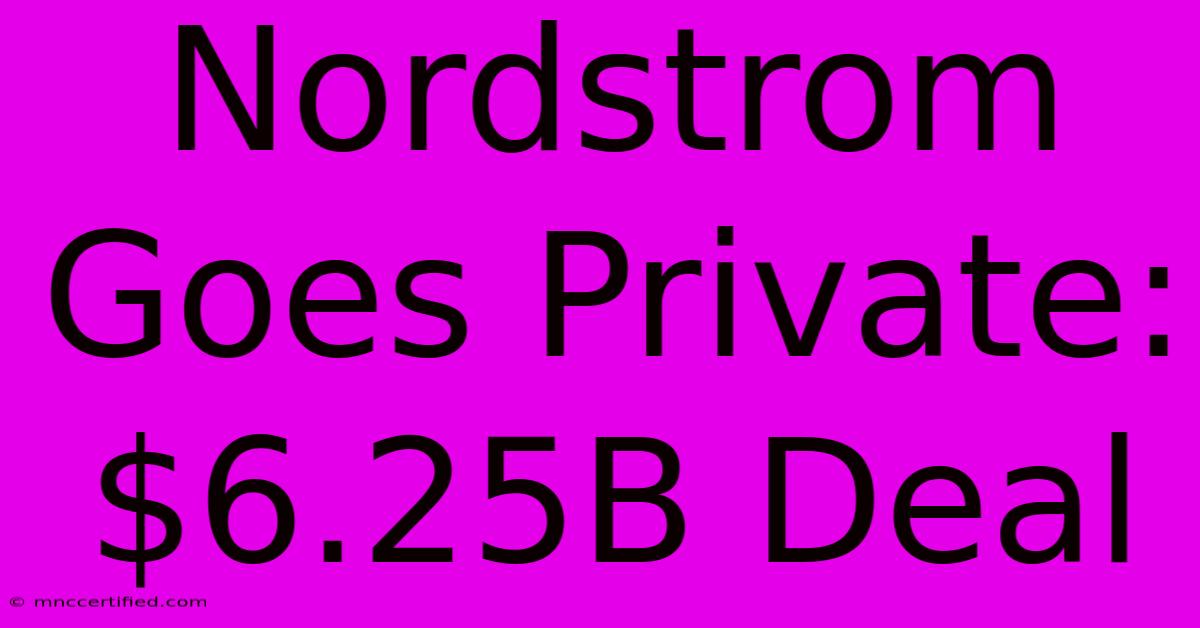Nordstrom Goes Private: $6.25B Deal

Table of Contents
Nordstrom Goes Private: A $6.25 Billion Deal Reshapes Retail
Nordstrom's iconic presence in the retail landscape has undergone a significant transformation. In a deal valued at $6.25 billion, the luxury department store chain has gone private, marking a major shift in the company's trajectory and raising important questions about the future of brick-and-mortar retail. This article delves into the intricacies of this landmark transaction, analyzing its implications and exploring what it means for Nordstrom, its employees, and the broader retail industry.
The Key Players and the Deal's Structure
The privatization of Nordstrom was spearheaded by a group led by the Nordstrom family, who will once again hold a majority stake in the company. This strategic move effectively removes the pressures of quarterly earnings reports and short-term market fluctuations, allowing for a longer-term vision focused on revitalizing the brand and adapting to the evolving retail environment. The $6.25 billion deal involves taking the company private through a leveraged buyout, a complex financial maneuver utilizing debt financing.
Understanding Leveraged Buyouts (LBOs)
An LBO is a transaction where a company is acquired using a significant amount of borrowed money (leveraging). The debt is then repaid using the acquired company's assets and cash flow. In Nordstrom's case, this structure allows the family to regain control while minimizing their upfront cash investment. This strategy is common when a company wants to avoid the scrutiny and demands of public markets.
Why Did Nordstrom Go Private?
Several factors contributed to the Nordstrom family's decision to take the company private:
-
Long-Term Vision: Freed from the pressure of quarterly earnings, Nordstrom can implement long-term strategies focused on innovation, digital transformation, and enhancing the customer experience. This includes investing in areas like e-commerce, personalized service, and supply chain optimization.
-
Strategic Restructuring: Going private allows the company to undertake a more aggressive restructuring without the immediate scrutiny of public investors. This could involve store closures, workforce adjustments, or major changes to its business model.
-
Increased Flexibility: As a private company, Nordstrom has greater flexibility in making strategic decisions, such as acquisitions or investments in new technologies, without the constraints of shareholder approvals.
-
Family Control: The deal ultimately returns a significant degree of control to the Nordstrom family, allowing them to execute their vision for the future of the brand without external pressures.
Implications for the Future of Nordstrom
The move to private ownership marks a pivotal moment for Nordstrom. While the immediate impact might not be immediately apparent to shoppers, several key changes are anticipated:
-
Enhanced Customer Experience: Expect to see investments in improving the in-store and online shopping experience. This might include personalized recommendations, enhanced loyalty programs, and innovative omnichannel strategies.
-
Focus on Profitability: While the immediate goal is to restructure and regain profitability, long-term sustainability is crucial. We might see a refined focus on product selection and operational efficiency.
-
Potential Store Closures and Restructuring: Some analysts predict a streamlining of the Nordstrom store network, potentially leading to store closures or format changes to optimize profitability.
Impact on the Broader Retail Industry
Nordstrom's move underscores the challenges faced by traditional brick-and-mortar retailers in today's dynamic market. It signals a potential trend of family-owned companies reclaiming control to better navigate the evolving retail landscape. This privatization could influence other large retailers to consider similar strategies to achieve long-term stability and growth.
Conclusion: Navigating the Future of Retail
Nordstrom's $6.25 billion privatization is a significant event with far-reaching consequences. It signifies a shift in how large retail companies approach growth and adaptation in the face of competition from e-commerce giants and evolving consumer behavior. The success of this strategy will depend on Nordstrom's ability to execute its long-term vision and adapt to the ever-changing demands of the modern retail market. Only time will tell if this bold move will revitalize the brand and secure its future in a competitive landscape. The future of Nordstrom, and indeed the future of department stores, remains to be seen.

Thank you for visiting our website wich cover about Nordstrom Goes Private: $6.25B Deal. We hope the information provided has been useful to you. Feel free to contact us if you have any questions or need further assistance. See you next time and dont miss to bookmark.
Featured Posts
-
Two Techs Embiid Ejection Vs Spurs
Dec 24, 2024
-
Christmas Eve Bell Ringing For Children
Dec 24, 2024
-
Packers 2025 Draft Position Holds
Dec 24, 2024
-
Fever Sends Bill Clinton To Hospital
Dec 24, 2024
-
Trumps Interest In Greenland Panama Canal
Dec 24, 2024